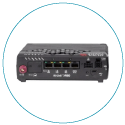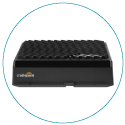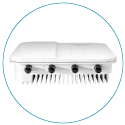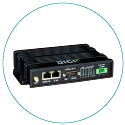Custom-Built Router Apps Easily Deployed & Managed From the Cloud
![]() Each organization has a unique set of uses for wired and wireless routers. With a router software development kit (SDK), each company take those uses into its own hands.
Each organization has a unique set of uses for wired and wireless routers. With a router software development kit (SDK), each company take those uses into its own hands.
Router SDK allows an organization to write applications to run on its routers — creating custom uses that are specific to its needs, reducing expenses, and improving the bottom line.
How Does Router SDK Add Value to My Solution?
Through the development of custom applications, IT teams can add and extend functionality to their routers. Ultimately, this approach can solve problems that a basic routing solution may not otherwise address.
Some of Cradlepoint’s hardware platforms, for example, have dual-SIM capabilities, meaning they offer the potential to connect to and choose between two different cellular providers.
A business that needs to install routers in multiple locations traditionally must determine which cellular connection works best at each location. First, the installer would have to manually check the connectivity with cellular provider A. Then he or she would have to check the connectivity with cellular provider B. Finally, he or she would have to compare the two connections, determine which is strongest, and then configure the router accordingly. This process would need to be repeated manually at each location.
With router SDK, an application could be written that automates the process. The application would check each cellular connection, determine which was best, then select the appropriate provider. The entire process could be turned into a no-touch situation, thereby saving the company on the cost of truck rolls, installation, and labor costs — and the time required to manually complete the process.
What Are the Short-Term Financial Benefits of SDK?
Businesses that connect to Internet of Things (IoT) devices may find SDK and Fog Computing particularly beneficial. Companies could write an application that collects simpler data and sends it directly where it needs to go, eliminating the traditional cost associated with purchasing expensive hardware to facilitate that process. Adding this local intelligence to a router permits domain knowledge to select when and which data to upload.
SDK enables companies to develop solutions specific to their challenges — no matter what those challenges might be. For example, employees at a company that runs and operates emergency response vehicles were frequently locking themselves out of their vehicles; SDK allowed IT teams to create an app that enabled these employees to unlock their vehicles via their tablets or smartphones. These employees no longer have to wait for a truck to be dispatched to unlock their vehicles, and the company saves money by not having to pay for locksmith services (and by allowing their employees to focus more on the primary work at hand).
What Are the Long-Term Financial Benefits of SDK?
Because of the flexibility SDK provides, the long-term financial benefits are seemingly endless. Rather than being limited by what a router traditionally can do, companies use SDK to create new functionality and extensibility that doesn’t yet exist. This could be something as simple as a pinging application that ensures all routers are still active and communicating; if they aren’t, the application can immediately send alerts and notify IT staff that a device on the network isn’t responding. Simple, proactive applications such as these can provide substantial long-term savings.
Similarly, companies that are on limited data or bandwidth packages often must monitor the amount of data being sent so they can avoid unnecessary charges. With SDK, an application can be customized to send data to the cloud on an as-needed basis instead of on a predetermined schedule, which drastically reduces data use and costs.
IT staff familiar with software development can create applications on their own instead of having to outsource application development to a third party. The company then owns and manages the app, securely adding unique value through proprietary IP. The in-house IT staff understands the application fully and can fix problems without relying on and paying for third-party services and solutions.
How are My Custom Apps Deployed?
Once a software expert has used Router SDK to develop a custom app package, the IT team can easily deploy that package — from a single pane of glass — to all of the organization’s routers through the cloud management services in the Cradlepoint NetCloud platform. All of the data, including intellectual property and codes, are kept private and secure throughout the process. Custom applications are protected both on devices and in the cloud.
In essence, Cradlepoint’s cloud management platform functions like Apple’s App Store, except for your routers. Because the entire process is so easy to manage, businesses can reap another layer of time and cost savings. There’s virtually no need for contracted IT engineers to help facilitate deployment and management.
For More Information:
- For Cradlepoint Solutions Contact a USAT Representative
- To Shop for Cradlepoint Products, Click Here
Share this Post
















